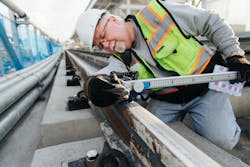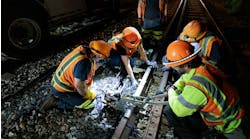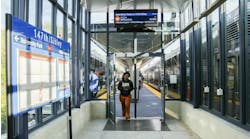Sound Transit awards multi-year maintenance contract to Advanced Rail Management
Advanced Rail Management, Corp. (ARM), has been awarded a multi-year, $24-million contract from Sound Transit for rail grinding, polishing and engineering inspection services.
The contract, which includes corrugation measurement and track geometry, ultrasonic and eddy current testing as part of the inspection and quality assurance requirements, is among the most comprehensive rail assessment and maintenance contracts awarded by a North American transit agency, says ARM. This contract is the first of its kind in North America to require rail polishing that adheres to customized acoustic requirements that are based on the ISO 3095 standard, which is considerably more demanding than the EN 13231-3 standard that North American railroads and transit systems typically grind to, according to the company.
“Sound Transit’s approach to looking after rail integrity, wear and noise and vibration generated by the rail surface finish has resulted in achieving a high level of standards compared to other North American rail systems in the realm of rail grinding and maintenance programs,” said ARM President Gordon Bachinsky.
To achieve Sound Transit’s goals, ARM, along with the National Research Council of Canada, an ARM consultant on the project, will implement a gradual-preventive grinding program. Through its comprehensive project team, ARM will have access to a variety of hi-rail and railbound rail grinding equipment fitted with coarse to extra-fine-grit grinding stones, depending on the metal-removal and surface-finish requirements. Milling equipment will also be available if needed to address surface damage requiring extensive metal removal.
To prepare for the grinding / polishing program, ARM and its consultants will conduct a comprehensive inspection to quantify rail surface conditions on the system.
Measurement will include:
- Systemwide track geometry testing of all typical parameters, such as curvature, gauge, profile, alignment, etc. It will also include optical rail profile measurement.
- Ultrasonic testing (UT), which will identify internal rail defects, including detail fractures from shelling, broken or fractured rail base, defective plant or field welds, bolt-hole cracks, etc., by type, size, and location. Squats and surface cracks that are identified by the UT test vehicle will be verified by hand tests.
- Pre- and post-grind eddy current testing, which will measure surface crack length, depth and geometry; proximity to other cracks; and electromagnetic properties of the rail base material. Reports will include measurements, graphs, images and trending reports; defects will be color coded to distinguish the severity.
- Corrugation measurement collected by a Corrugation Analysis Trolley (CAT), including roughness measurements that reference the guidelines of ISO 3095.
ARM will use data from these measurements to prioritize locations, estimate metal removal and the number of passes that will be required and determine the total number of miles to be addressed in order to establish an effective gradual-preventive grinding program. Corrugation measurement data will be used to guide rail polishing efforts to meet Sound Transit’s five- micrometer surface roughness target within the wheel/rail running band.
“Sound Transit’s grinding and polishing acceptance criteria will ensure that the wavelength signature of the finished rail will mitigate the types of noise and vibration-related problems previously encountered on the system,” said Mark Reimer, ARM’s director of business development & projects.
The five-year contract, which may be extended for five additional one-year terms, applies to Sound Transit’s existing Link Light Rail, as well as new line extensions, including the I-90 floating bridge across Lake Washington.


